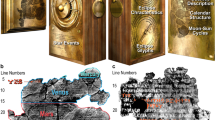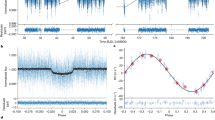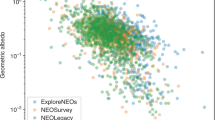Abstract
UNTIL 1781 the planet Saturn represented the outermost ooundary of the solar system; on March 13 that year the planet Uranus was discovered by William Herschel, and by the beginning of year of the discovery of Neptune five minbrfuanets had been found. In all these instances, the discovery was made at the telescope, in one or two cases purely by accident. The discovery of Neptune was on a far different level of human achievement; the discrepancies between the predicted and observed positions of Uranus since its discovery furnished the means whereby wo mathematicians, Adams and Le Verrier, applied their unrivalled skill to deduce independently the position of a new planet the gravitational attraction of which on Uranus, they confidently believed, was responsible for the discrepancies referred to.
This is a preview of subscription content, access via your institution
Access options
Subscribe to this journal
Receive 51 print issues and online access
$199.00 per year
only $3.90 per issue
Buy this article
- Purchase on Springer Link
- Instant access to full article PDF
Prices may be subject to local taxes which are calculated during checkout
Similar content being viewed by others
Author information
Authors and Affiliations
Rights and permissions
About this article
Cite this article
SMART, W. John Couch Adams and the Discovery of Neptune. Nature 158, 648–652 (1946). https://doi.org/10.1038/158648a0
Issue Date:
DOI: https://doi.org/10.1038/158648a0
This article is cited by
-
A racial classification for medical genetics
Philosophical Studies (2018)
-
The velocity of light and the evolution of electrodynamics
Il Nuovo Cimento (1956)
Comments
By submitting a comment you agree to abide by our Terms and Community Guidelines. If you find something abusive or that does not comply with our terms or guidelines please flag it as inappropriate.



